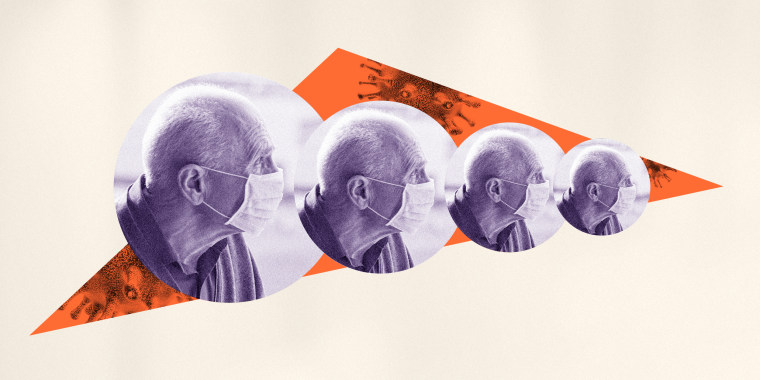In the early months of the pandemic, in our first lockdowns, we eagerly waited for time to pass. The faster it passed, we reasoned, the sooner it would be over. We did what we could to fill it up: We read a lot, worked on puzzles, made bread, tidied closets — naively thinking that by completing those tasks we would bring ourselves closer to safety.
Covid has hijacked our lives and taken away too much of our time. It has made our lives seem smaller, more self-contained, and limited our options.
But the passing of time did not alter our circumstances. We kept pushing back the deadline we’d set in our minds for it all to be over, hoping that by the next holiday, by the next birthday, by the date of the wedding, by the time the baby was born, we would have reclaimed our lives. Yet weeks and months passed, life went on and nothing really changed except that all that time was gone forever and there were fewer days ahead than behind us.
Covid-19 has restricted our lives in so many ways, eliminating pleasures we used to take for granted, stealing the time we had carefully set aside for this late stage of our lives. We had big ideas about what we would do when our time was our own. We had planned to spend these years not just with our grandchildren but traveling, exploring new countries and cultures, seeking out new adventures, reveling in our freedom. We would create meaningful work on our own time, learn more about the world, encounter new pleasures and share the wisdom we had gained. We would have only ourselves to please in the time we had left to spend.
Now we’re stuck in our homes, remembering trips from years past, trying to imagine a future in which we might again be free to do as we like. As we mourn the state of our world, we grieve the time lost to the Covid-19 crisis. Compelled by external events to re-evaluate our priorities, we struggle, as time flies by, to assign meaning to the activities and preoccupations that now consume us.
More than ever, our lives now revolve around our relationships. Yet it can be hard to figure out how to spend so much time locked up together with a spouse of 50 or more years. Living in such close quarters means complaints from decades ago resurface. Long-term habits that always irritated our partners are magnified, and tempers flare. Is there anything we haven’t discussed or need to rehash? Is there anything about each other that we don’t know?
But this isn’t the time to bring up old grudges, to resurrect arguments from the past. Our fates are joined and with no time to waste, we plot our daily course, calculating our respective risks, greater together than the sum of our parts.
Relationships with children and grandchildren, critical to our well-being, feel strained as well. The occasions that should bring joy are fraught with concerns about health and safety, about loss and possible death. Even the vaccinations we thought would bring peace of mind won’t liberate us from these tensions. New variants and lack of good data create continued uncertainties, and our new situation changes what we previously understood about how family life works.
Without the physical gestures that embody our relationships, the hugs and squeezes, we feel distant and insecure. So much is left unsaid. We try hard to maintain contact, but grandchildren grow and change as the months pass and we miss holding them tight at critical milestones. We worry they will barely remember us. Will we still matter in their lives? Will we be able to shore up our relationships before time runs out?
The pandemic didn’t create this crisis of time; it just brought it into focus. We chafe at the limitations on our freedom imposed to protect public health, but many of us have been struggling with our freedom for years. While raising children, our time was theirs. While working, our time was bought and paid for by our employers. When time is our own to spend, the burden is on us to use it wisely.
Covid-19 has hijacked our lives and taken away too much of our time. It has made our lives seem smaller, more self-contained, and limited our options — but it has not taken away all our freedoms or all our pleasures. Now the vaccines offer hope that by the spring or summer, as the days lengthen, our lives too will expand. How will we judge the time we spent in isolation when we look back from the next phase of our lives?
For young people, this year or two will become part of their personal and family lore. They will tell their grandchildren about remote work and school, about birthday parties and holidays on Zoom, about the absences and losses they endured and survived. But for us, the time we imagined spending together is lost and cannot be reclaimed.
For us, the time we imagined spending together is lost and cannot be reclaimed.
Many philosophers and psychologists have touted living in the moment as a way to bring our present lives into focus. We’re advised to let go of the past and stop worrying about the future, to savor experience as it happens. We’re urged to pay close attention, especially to joy and to moments of love and connection, but even to moments of sorrow and regret, and in so doing, slip from the bonds of time.
In response, we hopefully seize these moments, which are not the ones we imagined but those we have in hand, testing our resilience and reminding us to live each day, a lesson not too late to learn. It centers us, pauses our anxiety and helps us breathe. No shouting, no singing, just the breath going in and out, suspended in time, the mind still, the body at rest.


